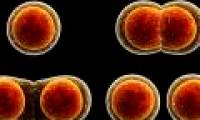
Research uncovering a third state of living things, beyond life and death, is challenging scientists' fundamental understanding of cell behavior.

Scientists have discovered a jellyfish-like parasite that does not have a mitochondrial genome. That means he doesn't breathe and lives a life completely free of oxygen.

600 million years ago there was a mutation that happened, which was the origin of all modern life on Earth.

Earth has no oxygen 2.4 billion years ago. Experiencing a leap of evolution, when oxygen appeared, the planet's ecosystem changed completely.

Using an extremely advanced medical simulation technique, American image maker Alexander Tsiaras has produced an extremely elaborate video, revealing the summary but full of the

No one can count the exact number of cells and galaxies, so every given figure is an estimate. However, based on estimates, humans have more cells than galaxies in the universe.

The American Institute of Environmental and Forestry Science (ESF) publishes 10 impressive newly discovered organisms of 2015, including one found in Vietnam.

Two red algae-like fossils are believed to be the oldest plant fossils ever found on Earth, shattering the hypothesis of life history on the green planet.

The pre-Cambrian fossil discovered in the rocks of southern China suggests that the life of complex multicellular organisms appeared at least 600 million years ago.

For a long time, biologists have been trying to understand the origin of complex life forms from single-celled microorganisms that evolved into reproductive forms of multicellular
 Research uncovering a third state of living things, beyond life and death, is challenging scientists' fundamental understanding of cell behavior.
Research uncovering a third state of living things, beyond life and death, is challenging scientists' fundamental understanding of cell behavior. Scientists have discovered a jellyfish-like parasite that does not have a mitochondrial genome. That means he doesn't breathe and lives a life completely free of oxygen.
Scientists have discovered a jellyfish-like parasite that does not have a mitochondrial genome. That means he doesn't breathe and lives a life completely free of oxygen. 600 million years ago there was a mutation that happened, which was the origin of all modern life on Earth.
600 million years ago there was a mutation that happened, which was the origin of all modern life on Earth. Earth has no oxygen 2.4 billion years ago. Experiencing a leap of evolution, when oxygen appeared, the planet's ecosystem changed completely.
Earth has no oxygen 2.4 billion years ago. Experiencing a leap of evolution, when oxygen appeared, the planet's ecosystem changed completely. Using an extremely advanced medical simulation technique, American image maker Alexander Tsiaras has produced an extremely elaborate video, revealing the summary but full of the
Using an extremely advanced medical simulation technique, American image maker Alexander Tsiaras has produced an extremely elaborate video, revealing the summary but full of the No one can count the exact number of cells and galaxies, so every given figure is an estimate. However, based on estimates, humans have more cells than galaxies in the universe.
No one can count the exact number of cells and galaxies, so every given figure is an estimate. However, based on estimates, humans have more cells than galaxies in the universe. The American Institute of Environmental and Forestry Science (ESF) publishes 10 impressive newly discovered organisms of 2015, including one found in Vietnam.
The American Institute of Environmental and Forestry Science (ESF) publishes 10 impressive newly discovered organisms of 2015, including one found in Vietnam. Two red algae-like fossils are believed to be the oldest plant fossils ever found on Earth, shattering the hypothesis of life history on the green planet.
Two red algae-like fossils are believed to be the oldest plant fossils ever found on Earth, shattering the hypothesis of life history on the green planet. The pre-Cambrian fossil discovered in the rocks of southern China suggests that the life of complex multicellular organisms appeared at least 600 million years ago.
The pre-Cambrian fossil discovered in the rocks of southern China suggests that the life of complex multicellular organisms appeared at least 600 million years ago. For a long time, biologists have been trying to understand the origin of complex life forms from single-celled microorganisms that evolved into reproductive forms of multicellular
For a long time, biologists have been trying to understand the origin of complex life forms from single-celled microorganisms that evolved into reproductive forms of multicellular









 Why do images of black holes appear to be burning from the outside?
Why do images of black holes appear to be burning from the outside? Researchers discover first 'conjoined' twin planets in the universe
Researchers discover first 'conjoined' twin planets in the universe Satellite launch to help... take selfies in space
Satellite launch to help... take selfies in space Why do most people with ALS not live more than 5 years, but Hawking lived to be 55?
Why do most people with ALS not live more than 5 years, but Hawking lived to be 55? Chilling revelations from 1,800-year-old glass 'treasure' in Antarctica
Chilling revelations from 1,800-year-old glass 'treasure' in Antarctica The sofa problem that has puzzled science for 6 decades has been solved
The sofa problem that has puzzled science for 6 decades has been solved Sad Eyes of the Ocean: The Story Behind the Stunning Beauty!
Sad Eyes of the Ocean: The Story Behind the Stunning Beauty! What happens if a star explodes near Earth?
What happens if a star explodes near Earth?